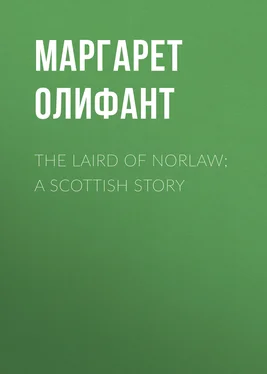Маргарет Олифант - The Laird of Norlaw; A Scottish Story
Здесь есть возможность читать онлайн «Маргарет Олифант - The Laird of Norlaw; A Scottish Story» — ознакомительный отрывок электронной книги совершенно бесплатно, а после прочтения отрывка купить полную версию. В некоторых случаях можно слушать аудио, скачать через торрент в формате fb2 и присутствует краткое содержание. Жанр: foreign_prose, literature_19, foreign_antique, на английском языке. Описание произведения, (предисловие) а так же отзывы посетителей доступны на портале библиотеки ЛибКат.
- Название:The Laird of Norlaw; A Scottish Story
- Автор:
- Жанр:
- Год:неизвестен
- ISBN:нет данных
- Рейтинг книги:3 / 5. Голосов: 1
-
Избранное:Добавить в избранное
- Отзывы:
-
Ваша оценка:
- 60
- 1
- 2
- 3
- 4
- 5
The Laird of Norlaw; A Scottish Story: краткое содержание, описание и аннотация
Предлагаем к чтению аннотацию, описание, краткое содержание или предисловие (зависит от того, что написал сам автор книги «The Laird of Norlaw; A Scottish Story»). Если вы не нашли необходимую информацию о книге — напишите в комментариях, мы постараемся отыскать её.
The Laird of Norlaw; A Scottish Story — читать онлайн ознакомительный отрывок
Ниже представлен текст книги, разбитый по страницам. Система сохранения места последней прочитанной страницы, позволяет с удобством читать онлайн бесплатно книгу «The Laird of Norlaw; A Scottish Story», без необходимости каждый раз заново искать на чём Вы остановились. Поставьте закладку, и сможете в любой момент перейти на страницу, на которой закончили чтение.
Интервал:
Закладка:
“Na, lads,” said the Mistress, with an indescribable bitterness in her tone; “it’s her and her bairns that are the heirs—and they’re to be found, and claim their inheritance, soon or syne.”
“Then this is what I’ll do,” cried Cosmo, springing to his feet; “I’ll go over all the world, but I’ll find Mary of Melmar! I’m not so strong as Huntley, or as Patie, but I’m strong enough for this. I’ll do what my father wished—if she should be in the furtherest corner of the earth, I’ll bring her hame!”
To the extreme amazement of the boys, the Mistress laid a violent hand on Cosmo’s shoulder, and, either with intention or unconsciously, shook the whole frame of the slender lad with her impetuous grasp.
“Will ye?” cried his mother, with a sharpness of suffering in her voice that confounded them. “Is it no’ enough, all that’s past? Am I to begin again? Am I to bring up sons for her service? Oh, patience, patience! it’s more than a woman like me can bear!”
Amazed, grieved, disturbed by her words and her aspect, her sons gathered around her. She pushed them away impatiently, and rose up.
“Bairns, dinna anger me!—I’m no’ meek enough,” said the Mistress, her face flushing with a mixture of mortification and displeasure. “You’ve had your will, and heard the story—but I tell you this woman’s been a vexation to me all my life—and it’s no’ your part, any one of you, to begin it a’ over again.”
CHAPTER XII
This story, which Mrs. Livingstone told with reluctance, and, in fact, did not tell half of, was, though the youths did not know it, the story of the very bitterest portion of their mother’s life. The Mistress never told, either to them or to any one else, how, roused in her honest love and wifely sincerity into sympathy with her husband’s generous efforts to preserve her own inheritance to his runaway cousin, she had very soon good reason to be sick of the very name of Mary of Me’mar; how she found out that, after years long of her faithful, warm-hearted, affectionate society, after the birth of children and consecration of time, after all the unfailing courage and exertions, by which her stout spirit had done much to set him right in the world, and, above all, in spite of the unfeigned and undivided love of a full heart like her own, the visionary heart of her husband had all this time been hankering after his first love.
Without preparation, and without softening, the Mistress found this out. He would not advantage his own family at the cost of Mary; he would seek for Mary through the whole world. These had been the words of Norlaw, ten years after Mary of Melmar’s disappearance, and even years after he had become the father of Huntley. The unsuspecting wife thought no harm; then he went and came for a whole year seeking for his cousin; and during that time, left alone day after day, and month after month, the mistress of Norlaw found out the secret. It was a hard thing for her, with her strong personality and burning individual heart, to bear; but she did bear it with an indignant heroism, never saying a word to mortal ear. He himself never knew that she had discovered his prior love, or resented it. She would have scorned herself could she have reproached him or even made him conscious of her own feelings. Good fortune and strong affection at the bottom happily kept contempt out of the Mistress’s indignation; but her heart continued sore for years with the discovery—sore, mortified, humiliated. To think that all her wifely, faithful regard had clung unwittingly to a man who, professing to cherish her, followed, with a wandering heart, a girl who had run away from him years before to be another man’s wife! The Mistress had borne it steadily and soberly, so that no one knew of her discovery, but she had never got beyond this abiding mortification and injury; and it was not much wonder that she started with a sudden burst of exasperated feeling, when Cosmo, her own son, echoed his father’s foolish words. Her youngest boy, her favorite and last nursling, the one bird that was to be left in the nest, could stir to this same mad search, when he had not yet ambition enough to stir for his own fortune. It was the last drop which made all this bitterness run over. No wonder that the Mistress lost command of herself for once, and going up to her own room in a gust of aggravated and angry emotions, thrust Cosmo away from her, and cried, “Am I to bring up sons for her service?” in the indignation of her heart.
Yes, it was a very pretty story for romance. The young girl running away, “all for love"—the faithful forsaken lover thinking of her in secret—rising up to defend her rights after ten long years—eagerly searching for her—and, with a jealous tenderness, refusing to do any thing which might compromise her title, while he alone still fondly believed in her return. A very pretty story, with love, and nothing else, for its theme. Yet, unfortunately, these pretty stories have a dark enough aspect often on the other side; and the Mistress, mortified, silent, indignant, cheated in her own perfect confidence and honest tenderness, when you saw her behind the scenes of the other pretty picture, took a great deal of the beauty out of that first-love and romantic constancy of Norlaw.
When Mrs. Livingstone went to her room, the sons, vexed and troubled, were a long time silent. Cosmo withdrew into a corner, and leaned his head on his mother’s little table. He, too, was deeply mortified, and could not keep back the hot boyish tears from his eyes—he felt himself set aside like a child—he felt the shame of a sensitive temperament at perceiving how greatly his mother was disturbed. Somehow she seemed to have betrayed herself, and Cosmo, jealous for her perfect honor, was uneasy and abashed at this disturbance of it; while still his heart, young, eager, inexperienced, loving romance, secretly longed to hear more of this mystery, and secretly repeated his determination. Huntley, who was pacing up and down the room, lifting and replacing every thing in his way which could be lifted, was simply confounded and thunderstruck, which emotions Patie shared with his elder brother. Patie, however, was the most practical of the three, and it was he who first broke the silence.
“Somehow or other this vexes my mother,” said Patie; “let us ask her no more questions about it; but, Huntley, you ought to know all the hiding-holes about the house. You should look up this will and put it in safe hands.”
“In safe hands?—I’ll act upon it forthwith! Are we to keep terms with Melmar after all that’s past, and with power to turn him out of his seat?” cried Huntley; “no, surely; I’ll put it into hands that will carry it into effect, and that without delay.”
“They would want either this Mary, or proof that she was dead, before they would do any thing in it,” said Patie, doubtfully; “and yet it’s a shame!”
“She is not dead!” interrupted Cosmo; “why my mother should be angry, I can’t tell; but I’ll find out Mary of Melmar, I know I shall, though it should be twenty years!”
“Be quiet, Cosmo,” said his elder brother, “and see that no one troubles my mother with another question; she does not like it, and I will not have her disturbed; but I’ll tell you what I’ll do. We know little about business, and we’re not of a patient race. Me’mar had better not come near any of us just now, unless it were you, Patie, that can master yourself. I should like to knock him down, and my mother would do worse. I’ll write to this friend of the minister’s, this writer, and put it all in his hands—it’s the best thing I can see. What do you say?”
Patie gave his assent readily; Cosmo did not say any thing. The boy began to feel his youth somewhat bitterly, and to think that they did not care for his opinion; so he went out, and swung himself up by an old elm tree into one of the vacant windows of the castle, a favorite seat of Cosmo, where, among the cool ivy, and hidden by the deep recess of the thick old wall, he could see the sunset, and watch how the shadows stole over the earth. The Eildons were at his right hand, paling gradually out of their royal purple against the pale sky in the east, and the last long rays of the sunset, too low to reach them, fell golden-yellow upon Tyne, and shed a pathetic light on the soft green bank before the door of Norlaw. The common sounds of life were not so subdued now about this lonely house; even the cackle of poultry and bark of dogs seemed louder since the shutters were opened and the curtains drawn back—and Marget went firmly forth upon her errands to the byre, and the hush and stealth of mourning had left the place already. Who would not escape somewhere into some personal refuge out of the oppressive shadow of grief, while youth remains to make that possible? Huntley had been startled to feel that there was such an escape for himself when Katie Logan took his hand in the fullness of her sympathy—and Huntley and Patie together were seeking a similar ease now in discussing the plans of their future life together. Cosmo was only a boy; he had no plans yet which could be called plans—and he was too young to be moved by the hand or the voice of any woman. So he sat among the ivy in the ledge of the deep old window, with his head uncovered, his fair hair falling over his long white hands, and those dark liquid eyes of his gazing forth upon as fair a landscape as ever entered into the dream of a poet.
Читать дальшеИнтервал:
Закладка:
Похожие книги на «The Laird of Norlaw; A Scottish Story»
Представляем Вашему вниманию похожие книги на «The Laird of Norlaw; A Scottish Story» списком для выбора. Мы отобрали схожую по названию и смыслу литературу в надежде предоставить читателям больше вариантов отыскать новые, интересные, ещё непрочитанные произведения.
Обсуждение, отзывы о книге «The Laird of Norlaw; A Scottish Story» и просто собственные мнения читателей. Оставьте ваши комментарии, напишите, что Вы думаете о произведении, его смысле или главных героях. Укажите что конкретно понравилось, а что нет, и почему Вы так считаете.












